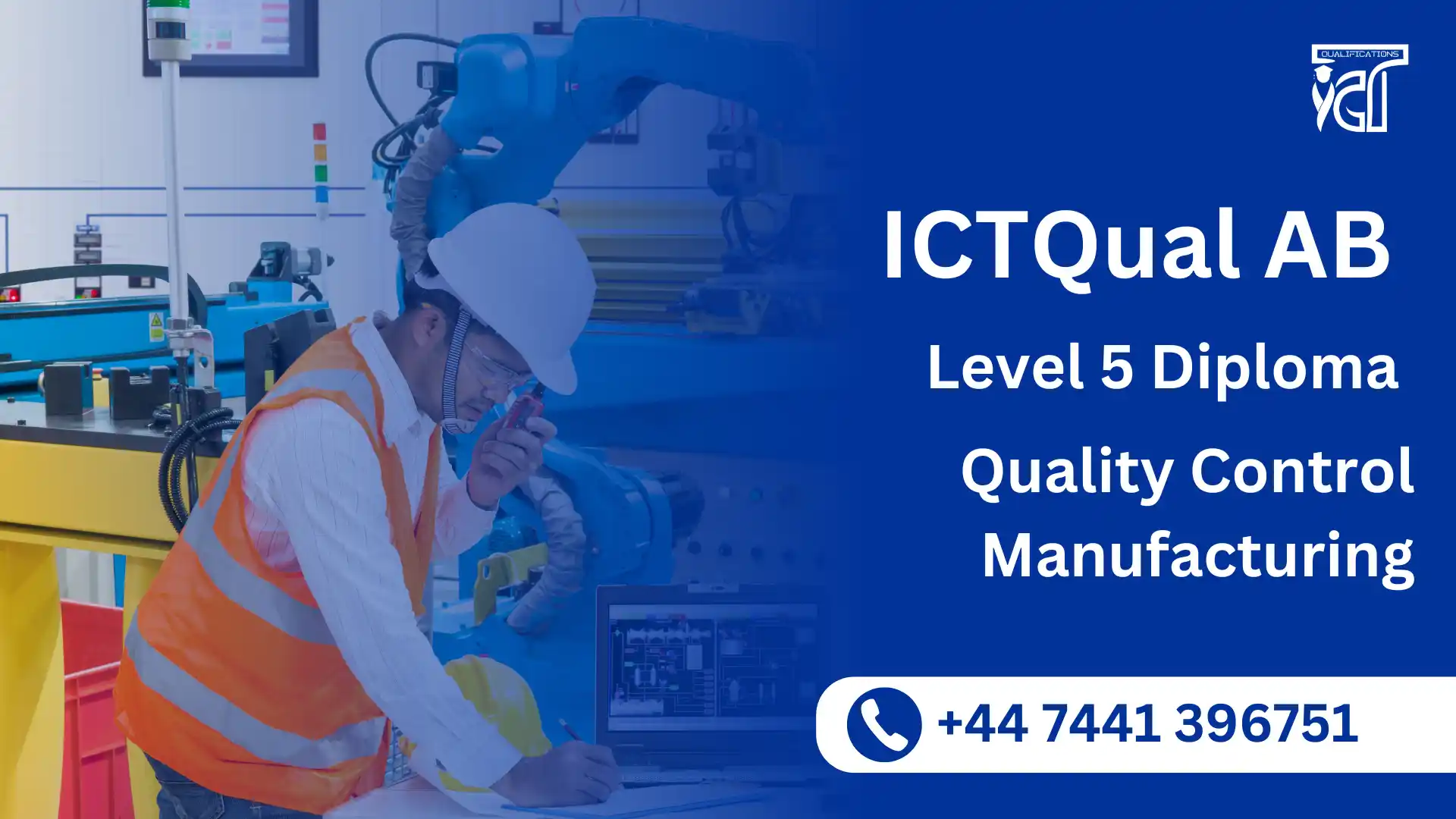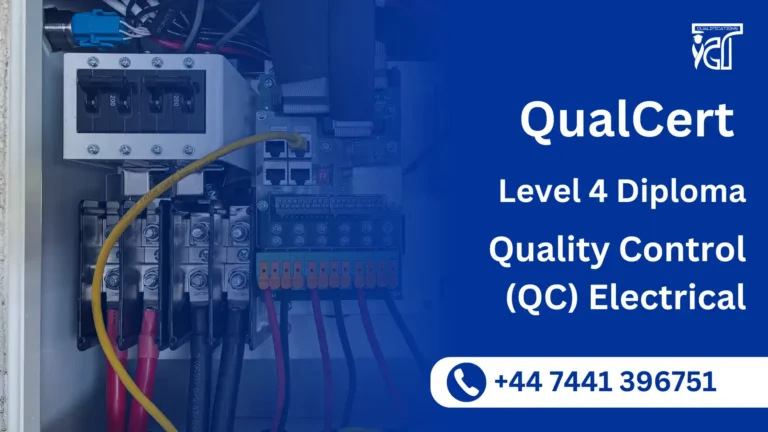The ICTQual AB Level 5 Diploma in Quality Control Manufacturing is a professionally designed qualification aimed at equipping learners with advanced knowledge and applied skills required for quality control and assurance in complex manufacturing environments. This course is tailored for individuals who wish to take on higher-level responsibilities in maintaining, managing, and improving the quality systems of industrial production processes.
As manufacturing sectors evolve with stricter regulations, advanced technologies, and global quality standards, this diploma prepares learners to understand, implement, and lead robust quality frameworks. It covers key topics such as quality management systems (QMS), root cause analysis, Six Sigma practices, auditing processes, compliance with international standards (such as ISO 9001), and continuous improvement methodologies.
Learners of this program gain the critical ability to analyze production operations, ensure product reliability, and align manufacturing outputs with customer expectations and regulatory demands. The diploma is ideal for individuals aspiring to become senior quality inspectors, quality assurance supervisors, or quality managers. With its practical focus and industry-relevant curriculum, the ICTQual AB Level 5 Diploma in Quality Control Manufacturing opens doors to leadership roles and further academic or professional progression in quality management.
ICTQual AB Level 3 Certificate in Quality Control Manufacturing
This qualification, the ICTQual AB Level 5 Diploma in Quality Control Manufacturing, consists of 10 mandatory units.
- Strategic Quality Management in Manufacturing Operations
- Advanced Measurement Systems and Calibration Techniques
- International Quality Standards and Regulatory Compliance (ISO, ASTM, etc.)
- Statistical Quality Control and Process Capability Analysis
- Supplier Quality Assurance and Auditing Practices
- Product Lifecycle Quality Planning and Risk Management
- Root Cause Analysis and Continuous Improvement Methodologies
- Quality Control in Automation and Modern Production Systems
- Leadership and Team Supervision in Quality Environments
- Technical Documentation, Reporting, and Quality Metrics Evaluation
Here are the learning outcomes for each study unit:
Strategic Quality Management in Manufacturing Operations
- Understand the principles of strategic quality planning within manufacturing
- Develop and implement quality strategies aligned with organisational goals
- Evaluate the impact of quality management systems on operational performance
Advanced Measurement Systems and Calibration Techniques
- Apply advanced measurement methods to assess product accuracy and compliance
- Understand calibration procedures for precision instruments and equipment
- Ensure traceability and consistency in measurement systems
International Quality Standards and Regulatory Compliance (ISO, ASTM, etc.)
- Interpret and apply international standards relevant to manufacturing quality control
- Ensure processes meet regulatory and customer-specific compliance requirements
- Integrate global standards into organisational quality systems
Statistical Quality Control and Process Capability Analysis
- Utilise statistical tools to monitor process performance and variation
- Conduct process capability studies and interpret control charts
- Apply data-driven insights to maintain and improve quality
Supplier Quality Assurance and Auditing Practices
- Assess supplier performance against quality and compliance benchmarks
- Plan and conduct supplier audits to ensure conformity with standards
- Develop action plans to address supplier-related quality issues
Product Lifecycle Quality Planning and Risk Management
- Implement quality planning throughout the product development lifecycle
- Identify and mitigate quality risks using structured risk management tools
- Support cross-functional collaboration in product and process design
Root Cause Analysis and Continuous Improvement Methodologies
- Apply root cause analysis tools such as the 5 Whys and Fishbone Diagram
- Implement continuous improvement strategies like PDCA and Six Sigma
- Drive long-term improvements in product quality and process efficiency
Quality Control in Automation and Modern Production Systems
- Understand the role of automation in enhancing quality control
- Monitor automated processes and equipment for consistent output
- Integrate quality systems into digital manufacturing environments
Leadership and Team Supervision in Quality Environments
- Develop leadership skills for managing quality teams and workflows
- Communicate quality goals and support team development
- Foster a culture of quality and accountability within manufacturing operations
Technical Documentation, Reporting, and Quality Metrics Evaluation
- Prepare and manage detailed quality documentation and technical reports
- Analyse quality data to track performance indicators and trends
- Use reporting tools to support audits, compliance, and decision-making
Benefits of the ICTQual AB Level 3 Certificate in Quality Control Manufacturing
The ICTQual AB Level 5 Diploma in Quality Control Manufacturing delivers a range of benefits designed to enhance both professional growth and practical competence. This qualification is ideal for individuals aiming to excel in quality assurance and leadership roles within the manufacturing industry.
Key Benefits Include:
- Advanced Industry Knowledge
Learners gain in-depth understanding of modern quality control methodologies, statistical tools, root cause analysis, and quality management systems relevant to today’s manufacturing environments. - Practical Leadership Skills
The course develops supervisory and managerial competencies, enabling learners to lead quality teams, conduct audits, and implement continuous improvement initiatives effectively. - Increased Employability
Holding a Level 5 qualification enhances your CV and professional profile, making you a strong candidate for mid to senior-level roles such as Quality Supervisor, QA/QC Manager, or Process Improvement Analyst. - Cross-Sector Application
Skills acquired are transferable across a wide range of manufacturing sectors, including automotive, electronics, textiles, pharmaceuticals, plastics, and food production. - Preparation for Higher Roles
The course builds a solid foundation for further qualifications in quality control or management, such as Level 6 diplomas or professional certifications like Lean Six Sigma or ISO Lead Auditor. - Improved Organizational Contribution
Learners are equipped to identify inefficiencies, reduce waste, and improve product standards—enhancing both customer satisfaction and overall business performance. - Compliance and Risk Management
The diploma provides a thorough understanding of regulatory compliance, documentation control, and international standards (like ISO 9001), helping organizations avoid penalties and maintain certifications.
This qualification empowers professionals to confidently take on more strategic responsibilities, drive quality excellence, and support long-term success within the manufacturing sector.
Who is the ICTQual AB Level 3 Diploma in Quality Control Manufacturing Best Suited For?
The ICTQual AB Level 5 Diploma in Quality Control Manufacturing is specifically designed for professionals who are committed to advancing their careers in quality management and manufacturing operations. It is suited for individuals who aim to take on leadership roles in ensuring product excellence, process improvement, and compliance with international quality standards.
The ideal learner includes:
- Experienced Quality Control Personnel
Individuals currently working in quality inspection, assurance, or testing roles who want to move into supervisory or managerial positions. - Production Supervisors and Technicians
Professionals involved in day-to-day manufacturing operations who need a deeper understanding of quality systems and wish to lead quality-focused initiatives. - Engineering and Technical Staff
Those with a background in mechanical, industrial, or manufacturing engineering looking to expand their expertise in quality management practices. - Mid-career Professionals
Employees with 3–5 years of experience in manufacturing or related sectors seeking a formal qualification to validate their skills and support career progression. - Aspiring Quality Managers
Learners motivated to transition into roles such as Quality Control Manager, QA/QC Coordinator, Compliance Officer, or Process Improvement Specialist. - Professionals Seeking International Recognition
Individuals looking for a globally recognized qualification that enhances their credentials and opens up job opportunities across diverse industries.
This diploma is best suited for motivated learners who are analytical, detail-oriented, and passionate about maintaining high standards in manufacturing environments through continuous improvement and effective quality systems.
Entry Requirements
Register Now
Qualification Process
Qualification Process for the ICTQual AB Level 5 Diploma in Quality Control Manufacturing
- Self-Assessment:
Begin by evaluating your eligibility to ensure you meet the qualification requirements, including work experience, knowledge, and language proficiency. - Registration:
Complete your registration by submitting the required documents, including a scanned copy of a valid ID, and paying the registration fee. - Induction:
An assessor will conduct an induction to confirm your eligibility for the course and explain the evidence requirements. If you do not meet the criteria, your registration will be cancelled, and the fee will be refunded. - Assignments & Evidence Submission:
Provide all assignments and the necessary evidence based on the assessment criteria outlined in the course. If you are unsure of the required evidence, consult with the assessor for guidance on the type and nature of evidence needed. - Feedback and Revision:
The assessor will review your submitted evidence and provide feedback. Evidence that meets the criteria will be marked as “Criteria Met,” while any gaps will be identified. You will be asked to revise and resubmit if needed. - Competence Evidence:
Submit final evidence demonstrating that all learning outcomes have been met. This evidence will be marked as “Criteria Met” by the assessor once it is satisfactory. - Internal Quality Assurance (IQA):
The Internal Quality Assurance Verifier (IQA) will review your evidence to ensure consistency, quality, and compliance with standards. - External Verification:
The IQA will submit your portfolio to ICTQUAL AB External Quality Assurance Verifiers (EQA) for final confirmation. The EQA may contact you directly to verify the authenticity of your evidence. - Certification:
Upon successful completion of all checks, ICTQUAL AB will issue your official certificate, confirming that you have attained the ICTQual AB Level 5 Diploma in Quality Control Manufacturing.







